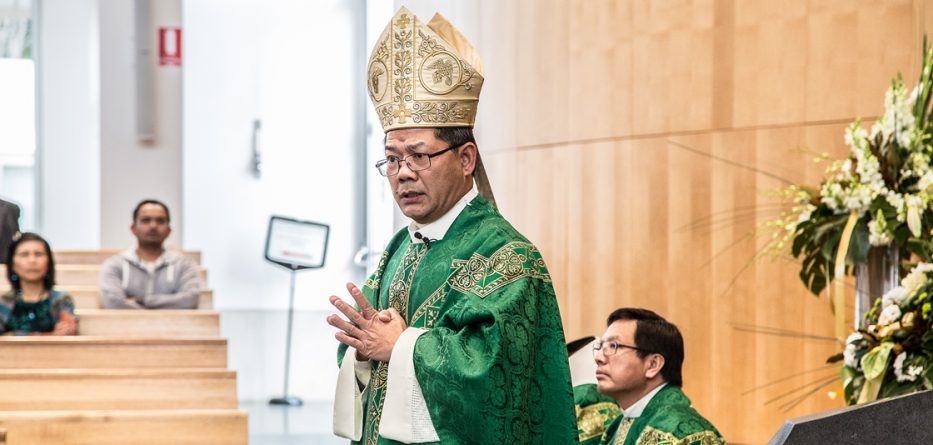Homily given by Most Rev Vincent Long OFM Conv, Bishop of Parramatta
Holy Mass of Mary, Queen and Mother of Mercy, Year C, with the Mercy Cross and Relics at Mt Schoenstatt, Mulgoa, Saturday 5 November 2016.
Dear friends in Christ,
St Peter said to Jesus in a state of excitement after having experienced the transfiguration, “Lord, it is wonderful for us to be here.” This morning, I can also echo his words and his sentiments as we gather on Mt Schoenstatt, which literally means a beautiful place. “It is wonderful for us to be here”.
Our thanks to the Schoenstatt sisters and their associates for making this place into an oasis of hope, faith and love, a sanctuary for reflection, spirituality and communion. The Diocese of Parramatta is all the richer because of their witness of a joyful life which is deeply rooted in the love of God, devotion to Mary and service to the people.
Today, as a diocesan family, we make this pilgrimage carrying with the symbols of mercy that have travelled throughout the Diocese. We seek to grow in our discipleship of love and mercy in imitation of the Master. Thus, the Way of Mercy is symbolic of the missionary journey that we are called to make individually and as a community.
Just as God in Christ did not hold on to his divine status but emptied himself and made himself close to us, we are called to go beyond ourselves and make ourselves neighbours to others. It is a journey, as Pope Francis reminds us, of encounter, dialogue and engagement with our brothers and sisters.
And like Jesus, we especially reach out to those who are on the margins, those who are excluded or stigmatised in any way, those who are victims of intolerance, discrimination and hatred. In this journey, we learn not only to give but also to receive, not only to grow in our conviction but also to be challenged, not only to share the gift of our faith but also to be enriched by others’ spiritual insight.
Far from being a mere exercise in religious piety, ours is a humble pilgrimage that is encompassed in the vision of the Vatican Council. We seek to walk with all people, identifying with their griefs and anxieties, their joys and their hopes. We seek to strengthen and encourage one another to follow Christ. Through the Way of Mercy, we especially accompany those who struggle to live and still fall short of the Christian ideal.
We endeavour to live out the ecclesial inclusiveness which is characteristic of a Church that walks with the suffering, to bind their wounds, to heal their hurt and brokenness. This Sunday, the Church especially invites us to show solidarity with prisoners who are often stigmatised as unworthy of even of a second chance.
Each one of us is invited to follow the merciful example of God – forgiving and loving rather than judging and condemning. No matter what the sin – God’s love is unconditional as evident on the cross.
Today, we also honour Mary as Queen and Mother of Mercy. Like Jesus, Mary identified herself with the poor and the lowly. The Magnificat is a song of praise that she gave to God for the love and mercy bestowed on the poor and the lowly.
In the Gospel, Mary demonstrates her concern and advocacy for those in a predicament. We are told that the wine ran out in the middle of the wedding banquet. It was Mary who was aware of this potentially embarassing situation.
Perhaps it is a woman’s instinct when it comes to feeding others. I know everytime I come home, the first thing my mother worries about is to feed me. Mary not only picks up the crisis but she also knows where to turn to for help. They have no wine left, she tells Jesus. Despite his mysterious answer, “my hour has not yet come”, Mary believed that Jesus would intervene.
She tells the attendants: “Do whatever he tells you”. These words contain all of Mary’s faith and trust in Jesus. She anticipates God’s grace by preparing herself to receive it.
We are reminded of the story of Jesus feeding the multitude in the desert. There the disciples wanted to send the people away. They acted in fear and showed lack of faith. By contrast, Mary engaged the people and pleaded with Jesus on their behalf. She acted in solidarity with the afflicted and demonstrated her tremendous faith and love.
Brothers and sisters,
Let us pray that the miracle at Cana may happen again in our lives and in our Church. May we learn the rythm of dying and rising, of letting the new wine flow in place of the old. May Mary’s example of surrendering in trust help us to respond to our situations of need and calamity.
May we learn with the wedding guests at Cana to drink the new wine of deep trust, deeper love and deeper commitment each day in our pilgrimage to God.
May we also follow Mary’s example of making the missionary journey to our brothers and sisters in need and by our active discipleship, witness and engagement be the leaven for the Kingdom.
Bishop Vincent’s homilies are archived here.








